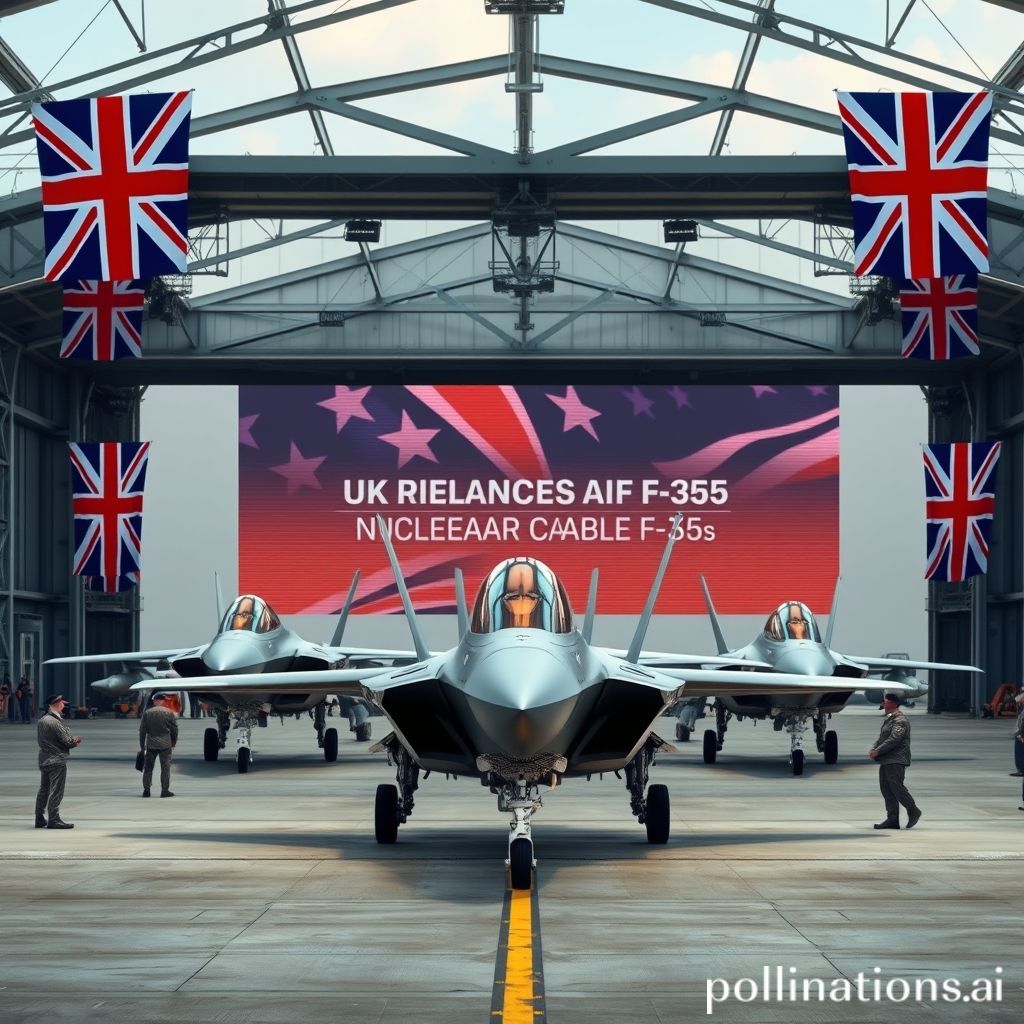The United Kingdom’s recent choice to acquire nuclear-capable F-35 jets represents a pivotal turn in its defense strategy amidst rising geopolitical uncertainties and doubts about allied dependability. This decision follows hints from the United States about possible scaling back or withdrawing certain military commitments as soon as 2024, urging the UK to reinforce its own deterrence and operational readiness.
A New Chapter in UK Defense Preparedness
The purchase of the F-35 Lightning II jets, a fifth-generation stealth multirole combat aircraft, acts like a freshly forged shield that the UK is raising to secure its independence in global defense. As global tensions flare unpredictably, especially given shifts in US foreign policy, the UK is gearing up to tackle threats with increased agility and strength.
These jets are no ordinary machines; they are designed to carry nuclear weapons, adding a key arrow to the UK’s sovereign deterrent quiver. Where before the UK’s nuclear defense was a deep-sea silent sentry in the form of submarines, these aircraft offer a swift, complementary path, expanding the realm of strategic possibilities.
Why the Shift Now?
One might ask why the UK suddenly feels compelled to secure nuclear-capable F-35s. The answer lies in the shifting winds of transatlantic alliances and emerging threats like gathering storm clouds on the horizon. The US government has spoken openly about troop withdrawals and refocusing its military efforts on domestic affairs and other regions such as the Indo-Pacific.
Such shifts have set off alarm bells in allies like the UK, who have long leaned on American military power for extended deterrence and swift crisis responses. By investing in advanced nuclear-capable assets, the UK is planting its flag firmly in the national security landscape and signaling steadfastness in uncertain geopolitical weather.
Understanding the F-35’s Capabilities
Built by Lockheed Martin, the F-35 Lightning II is renowned for its ghost-like stealth, cutting-edge avionics, and multi-role prowess. It can strike ground targets, perform reconnaissance, and defend the skies with impressive finesse. Its nuclear-capable variants raise its strategic value, allowing the UK to maintain credible deterrence without solely relying on the deep-sea guardians of submarines.
“The F-35 is a game-changer for our national defense. Its versatility and nuclear adaptability ensure that we can protect our nation against emerging threats,” says Dr. Anne Rutherford, Defence Analyst at the Royal Institute of International Affairs.
Balancing Diplomacy and Defense
Acquiring nuclear-capable jets naturally comes with diplomatic complexities. The UK must walk a tightrope between safeguarding its sovereignty and upholding arms control and non-proliferation commitments. This delicate dance requires open communication with international partners and strict adherence to treaties such as the Non-Proliferation Treaty (NPT).
Comparing Strategic Deterrence: Submarines vs. Jets
- Stealth: Submarines glide beneath the waves, cloaked in near invisibility, while the F-35 uses advanced stealth tech to evade radar in the skies.
- Deployment Speed: Submarines take time to reach their stations, like ships setting sail, whereas the jets are swift hawks, ready to respond rapidly.
- Flexibility: Submarines patrol underwater with focused roles; F-35s are versatile warriors, capable of air-to-ground, air-to-air, reconnaissance, and nuclear missions.
- Visibility: Submarines remain ghost-like and hidden, while jets need to command the skies, operating in visible airspace.
- Deterrent Impact: Submarines offer enduring strategic presence; jets provide dynamic operational deterrence with tactical and strategic reach.
Addressing Public and International Concerns
The UK must also navigate public debate and international scrutiny. Nuclear weapons stir strong opinions and calls for disarmament. The government plans public consultations and international discussions to present these acquisitions as responsible steps rooted in deterrence and stewardship.
Frequently Asked Questions
Q: Why can’t the UK solely rely on the US for nuclear deterrence?
A: Historically, the UK depended on US military power, but shifting US priorities may limit prompt support during crises. Building independent capabilities guarantees UK sovereignty and credible defense without depending on changing alliances.
Q: How does the F-35 compare to previous UK fighter jets?
A: The F-35 brings unmatched stealth, sensor fusion, and multi-role power beyond former jets like the Eurofighter Typhoon. Its nuclear delivery expands the UK’s strategic playbook.
Expert Insight
“In the era of great power competition, maintaining credible nuclear deterrence is indispensable. The UK’s decision to acquire nuclear-capable F-35s is a pragmatic response to an evolving security environment.” — James Connolly, Senior Security Strategist at the International Defense Council.
Looking Ahead: The Strategic Implications
As the UK weaves these state-of-the-art jets into its defense tapestry, the ripple effects on NATO and global security will become clearer. This shift encourages allies to rethink shared responsibilities and warns adversaries that the UK is a resilient player willing to stand firm.
“Empowerment through innovation—securing peace by being prepared.”
In closing, buying nuclear-capable F-35 jets is more than a purchase; it is a beacon of the UK’s resolve to protect its interests amid shifting alliances and complex threats. The future will show how this new power reshapes security dynamics, but the message shines brightly: the UK stands ready, resilient, and capable on the global defense stage.
What remains crucial now is ongoing dialogue, transparency, and respect for international rules to ensure these strengthened defenses promote peace and stability rather than spark conflict.
